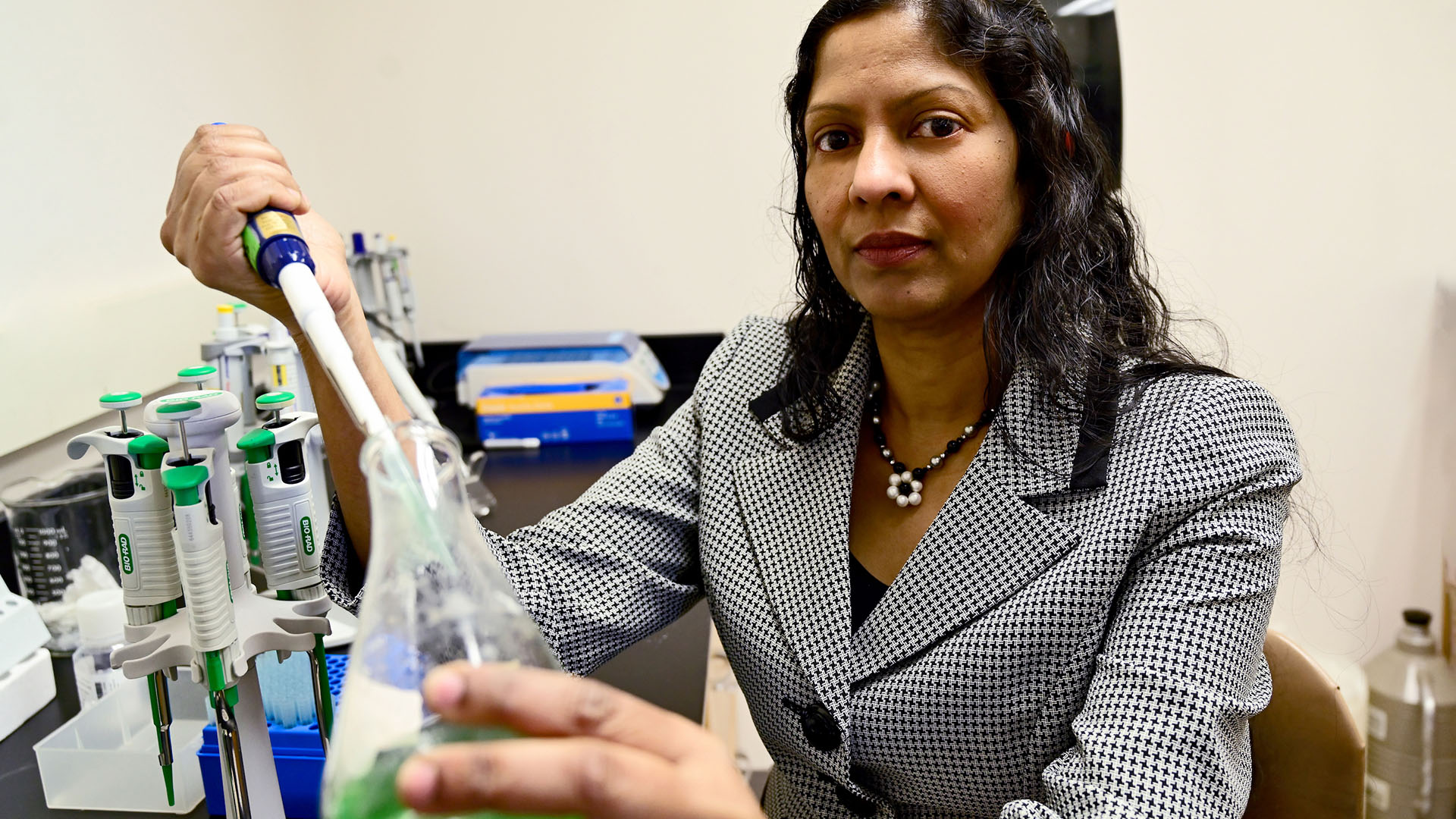Maryland Energy Institute Awards Morgan State University $100,000 Energy Innovation Grant to Continue Advanced Cyanobacterial Biomass Research at University’s Satellite Campus on the Chesapeake Bay
Funding will Support Launchpad for Businesses and Startups Using Research Conducted at MSU PEARL Laboratory
Morgan State University’s School of Computer, Mathematical and Natural Sciences (SCMNS) received a one-year $100,000 Phase I grant from the Maryland Energy Innovation Institute (MEI2) to support ongoing biofuel and renewable resource research. This program is designed to translate energy research and climate technologies developed at Maryland-based businesses, universities and federal laboratories into prototype devices or processes that can be used for technology development, and the creation or advancement of start-up companies within the state of Maryland.
Under the direction of Viji Sitther, Ph.D., professor of Biology at Morgan, the project will focus on scaled-up cyanobacterial biomass research with the aim of achieving large-scale biofuel production. The research is being conducted at Morgan’s Patuxent Environmental and Aquatic Research Laboratory (PEARL), located in Saint Leonard, Maryland (Calvert County), and situated in close proximity of the Chesapeake Bay watershed on the Patuxent River. The location and infrastructure of PEARL will enable access to saline water from a tidal tributary of the Chesapeake Bay and will facilitate the cost-effective production of renewable energy.
 “Our proposed technology is to produce biofuel in naturally-available saline water using HaloFdTM, a proprietary and fast-growing cyanobacterium, with proven capacity for lipid production,” said Dr. Sitther. “This research is the collaboration between a key private sector partnership with HaloCyTech LLC., a Baltimore startup venture based on technologies exclusively licensed from Morgan State.”
“Our proposed technology is to produce biofuel in naturally-available saline water using HaloFdTM, a proprietary and fast-growing cyanobacterium, with proven capacity for lipid production,” said Dr. Sitther. “This research is the collaboration between a key private sector partnership with HaloCyTech LLC., a Baltimore startup venture based on technologies exclusively licensed from Morgan State.”
Cyanobacteria, also referred to as blue-green algae, are microscopic organisms that live primarily in fresh water but can also be found in salt water. Cyanobacterial farming is considered an environmentally friendly sustainable agricultural practice which can be used for the production of food, energy, biofertilizers, cosmetics, and medicinal importance.
After initial testing and prototype development in the greenhouse, large-scale biomass production will occur at Morgan’s PEARL. Researchers from HaloCyTech will work with Morgan scientists to generate natural products from the unique, fast growing, cyanobacterial (blue-green algae) strains.
“The use of brackish water at the PEARL which contains a uniform salt composition of essential elements to support cyanobacterial growth and lipid production will greatly minimize input costs,” said Dr. Behnam Tabatabai, president of HaolCyTech. “The goal of this project is to develop a pilot system to obtain reliable and repeatable batches of biomass, produce bio-crude, and test fuel properties. Ultimately, it is envisioned that these efforts will pave the way for investment from producers, processors and the broader green energy sector.”
This funding initiative will support multiple seed grant awards as well as potential Phase 2 awards with a maximum ceiling of $200,000 for those projects that received a prior seed grant. To date, 17 Seed Grant awards have been made to recipients in the region, including Morgan as well as to institutions within the University System of Maryland and to Johns Hopkins University.
The Maryland Energy Innovation Institute (MEI2) is focused on translating university energy research into new clean energy companies in the State of Maryland and thus simultaneously benefiting our environment and creating high paying jobs to help our State economy. MEI2 proposes a unique opportunity through the following seed grant program to bridge the gap between academic transformative laboratory research results and prototype demonstrations to obtain investor interest.
For more information on ‘Large-scale Biofuel Production Using a Novel Cyanobacterium’ please contact Viji Sitther (viji.sitther@morgan.edu) or Behnam Tabatabai (halocytech@gmail.com).
Contact Information
Office of Public Relations & Strategic Communications
1700 East Cold Spring Lane
McMechen Hall Rm. 635
Baltimore, Maryland 21251
Contact Information
Office of Public Relations & Strategic Communications
1700 East Cold Spring Lane
McMechen Hall Rm. 635
Baltimore, Maryland 21251


